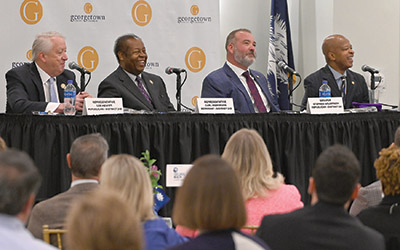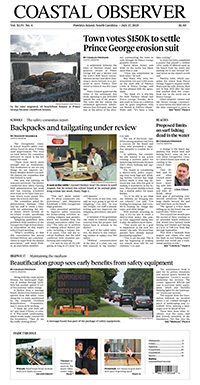Legislature
Lawmakers disagree but remain agreeable

They disagree on abortion, gun control and whether Highway 521 will ever be widened to four lanes between Andrews and Interstate 95.
But the partisan divide between the two Republicans and two Democrats who form the Georgetown County legislative delegation that prompted harsh words a year ago was left in the rear-view mirror as the lawmakers outlined plans for the new session at a forum last week.
The Republicans, state Sen. Stephen Goldfinch and state Rep. Lee Hewitt, represent a majority of the county’s voters.
Under a system of “weighted voting,” their votes can control the outcome of delegation decisions, as it did last year on two commission appointments.
State Sen. Ronnie Sabb called it a “cosmic shift.”
State Rep. Carl Anderson, a fellow Democrat, said it was a precedent that would harm the county.
“We don’t always agree, but we can always be agreeable,” Goldfinch told business leaders and local officials at the annual breakfast meeting sponsored by the Chamber of Commerce.
There is agreement about doing what is right for Georgetown County, Hewitt said, adding that “I really enjoy serving with these guys.”
Goldfinch also pointed out that the debate among the delegation members is more
focused than the debate in the General Assembly, particularly when it addresses local needs such as infrastructure and affordable housing.
The widening of Highway 521 has been a priority for Georgetown County for decades, since it would be a link with the interstate system.
The work has only reached to Andrews, where a bypass stops halfway around the town.
“I can remember when we started,” said Anderson, the longest-serving member of the delegation. “It has been placed on the back burner for several years, but we are revisiting that.”
The initial problem was obtaining right of way for the bypass, he said. Then the state Department of Transportation shifted its focus.
“We still have funds sitting there,” Anderson said, adding that he plans to ask for more.
Sabb thought the issue had picked up momentum three years ago when Gov. Henry McMaster raised the need for better hurricane evacuation routes along the coast.
“We talked about it that way,” he said. “521 really doesn’t cost that much to get it done.”
The key is convincing DOT that the project is important, Sabb said, but he noted that he just shifted from the Senate Transportation Committee to Medical Affairs.
“I’ll be the bad guy here,” Goldfinch said. “I have hope, but I think it’s going to be very difficult.”
As the cost of infrastructure projects has increased, the state leadership has focused on repairing existing roads rather than building new ones.
“That means we’re not going to get any state funding for any new expansion of a road, for any new development of a road,” Goldfinch said. That includes Highway 701 between Georgetown and Conway, the subject of another question from the audience. “If you want to do it, I believe the counties have to take the reins themselves.”
Goldfinch has pitched a transportation sales tax to County Council. He said before the meeting that he had only received interest from one member, Bob Anderson.
Horry County plans to put a 1-cent transportation sales tax on the ballot in November. It is estimated to raise $5.5 billion over 25 years.
“You know what you can build with $5.5 billion?” Goldfinch asked. “Everything. Everything Horry County’s ever wanted.”
Unlike a capital projects sales tax, which Georgetown County is proposing, a transportation sales tax is earmarked for repaying bonds.
“They could build I-73 if they wanted to,” Goldfinch said, referring to an interstate starting at Myrtle Beach that was first proposed in the 1990s.
A question about jobs and housing assistance for people with disabilities led to a discussion of affordable housing, which Goldfinch brought back to highways.
“There’s a very clear solution to affordable housing and it’s literally sitting right on the other side of our river,” he said. “Plantersville, Yauhannah and any place west of that has affordable housing right now. It’s just that it’s inaccessible for people that work at the beach.”
That could change with construction of a bridge over the Waccamaw River, a project once known as the Southern Evacuation Lifeline and now called the SC-22 Extension.
“If we had access to the other side of the river and you had a short two-and-a-half mile commute to the west side of Horry and Georgetown county, you’d have affordable housing tomorrow.”
There are tax credits available to help create affordable housing, Hewitt said.
“One of the biggest problems we’ve got is that when we do have the tax credits and people do propose affordable housing in certain neighborhoods, then everybody jumps up and says, ‘We don’t want that in our neighborhood,’” he said. “We’ve got to try to figure out that issue.”
Sabb pointed out that South Carolina has one of the highest eviction rates in the nation.
Along with increasing housing options the state needs “a minimum liveable wage,” he said, drawing applause.
Asked about the state budget, Hewitt, who serves on the Ways and Means Committee, said there will be surplus revenue this year, but there is pressure to raise pay for government workers who are being lost to private industry and for teachers.
Goldfinch said the state made a mistake in giving tax rebates rather than investing in infrastructure with prior supluses.
“We’re not prepared for the amount of people coming to South Carolina,” he said. “We have to prepare right now to prepare for those people. I don’t find that to be fair and equitable.”
He introduced a bill last year that would allow counties to impose a fee on people who change their driver’s license and vehicle registrations to South Carolina. The money would be earmarked for infrastructure. The bill is awaiting a vote in the Senate.
“People that move here should pay their fair share,” Goldfinch said.
Historically, the state has done just the opposite, he said.
“We make this mistake in South Carolina all the time,” Goldfinch said. “We live in paradise. You don’t have to pay people to live in paradise.”
Sabb agreed growth is a challenge.
“I think it’s a great problem to have,” he said. “There are significant opportunities.”
The senators differed over pending legislation that would allow people to carry a firearm without a permit.
“I’m convinced it’s not a good thing for our state,” Sabb said.
“Open carry does not concern me in the least bit,” Goldfinch said, although he thinks those people should have weapons training.
The delegation split on party lines when asked what they would do to protect “women’s reproductive health care choices.”
“Everything I can,” Sabb said. Anderson agreed.
“You’re asking me to choose the mother over the child in the womb, and I have a problem making that choice,” Goldfinch said. “You don’t choose the mother every time.”
Hewitt agreed.
“At some point, there is life, and life is worth protecting,” he said. “That is what we do all the time.”
South Carolina law bans abortions at six weeks. Sabb called that “extreme.”
Goldfinch said he supports abortion for “a rational medical reason,” but said 95 percent of nearly 12,000 abortions in the state last year were “elective.”
“He and I have meaningful discussions,” Sabb said. “We can always talk but I question the source that reaches that conclusion.”
“We work together very well,” Goldfinch said.
Sabb concluded with a poem about veterans and said “I’ve been praying for the guy to my right for a while, y’all. I’m just so proud of him and how he gave of himself.
Goldfinch was injured while serving with the National Guard in Africa last summer.
But he turned to Anderson, whose son and namesake was killed while serving in Iraq in 2004.
“When I’m in a room with Carl Anderson, I remember that I have nothing to complain about.”




